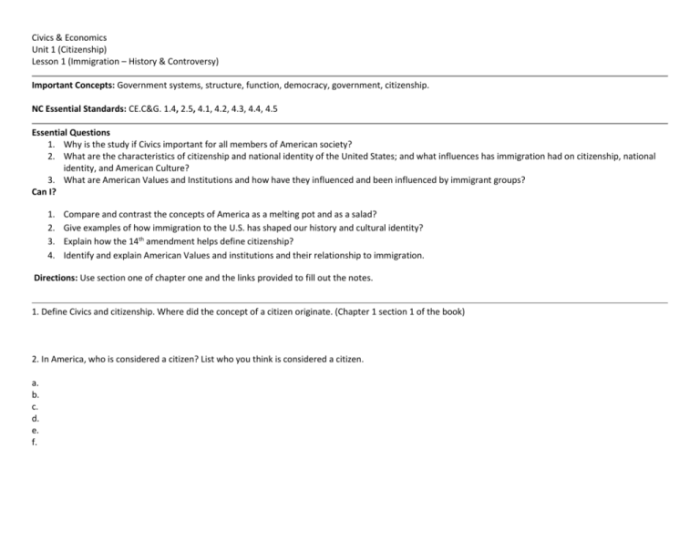Immigration pathway to citizenship answer key – Embarking on the journey of immigration pathway to citizenship, this comprehensive guide illuminates the legal pathways and benefits associated with obtaining citizenship. Delving into the intricacies of naturalization, permanent residency, and asylum, this exploration provides an authoritative overview of the requirements, procedures, and challenges faced by immigrants seeking citizenship.
Unveiling the complexities of the naturalization process, this guide unravels the eligibility criteria, application procedures, and language proficiency requirements. It further examines the benefits of permanent residency, outlining the rights and responsibilities associated with this status. Additionally, the guide explores the nuances of asylum and refugee status, highlighting the eligibility criteria and application process for seeking protection.
Legal Pathways to Citizenship: Immigration Pathway To Citizenship Answer Key

There are several legal pathways available for immigrants to obtain citizenship in a foreign country. These pathways typically vary depending on the country’s immigration laws and policies.
Naturalization
Naturalization is the process by which an immigrant becomes a citizen of a country after meeting specific eligibility requirements and completing an application process. The eligibility criteria may include residency requirements, language proficiency, and passing a civics test.
Permanent Residency, Immigration pathway to citizenship answer key
Permanent residency, also known as a green card, grants an immigrant the right to live and work permanently in a country. It is typically obtained through employment, family sponsorship, or investment. Permanent residents enjoy many of the same rights and privileges as citizens, but they cannot vote or hold public office.
Asylum and Refugee Status
Asylum and refugee status are granted to individuals who have fled their home country due to persecution or a well-founded fear of persecution based on race, religion, nationality, political opinion, or membership in a particular social group.
Naturalization Process

The naturalization process typically involves several steps:
- Meeting eligibility requirements, such as residency and language proficiency
- Submitting an application and supporting documents
- Passing a civics test and an English language proficiency test
- Taking an oath of allegiance to the new country
Permanent Residency
Permanent residency provides several benefits, including:
- The right to live and work permanently in the country
- Access to social benefits, such as healthcare and education
- The ability to sponsor family members for immigration
Permanent residency can be obtained through various ways:
- Employment-based immigration
- Family-based immigration
- Investment-based immigration
Asylum and Refugee Status
Asylum seekers are individuals who are seeking protection from persecution in their home country. Refugee status is granted to those who have already fled their home country due to persecution.
The criteria for asylum eligibility vary by country but generally include a well-founded fear of persecution based on race, religion, nationality, political opinion, or membership in a particular social group.
Asylum seekers and refugees have the right to apply for asylum and receive protection from being returned to their home country.
Citizenship Benefits
Obtaining citizenship offers numerous benefits, including:
- The right to vote and hold public office
- Access to government benefits and programs
- Protection from deportation
- The ability to travel freely with a passport
Citizenship provides greater rights and privileges compared to permanent residency, including the right to participate fully in the political and civic life of the country.
Challenges and Barriers to Citizenship

Immigrants may face various challenges and barriers in obtaining citizenship, including:
- Language barriers
- Cultural differences
- Financial constraints
- Discrimination and prejudice
- Complex and lengthy application processes
Advocacy groups and community organizations play a crucial role in assisting immigrants with citizenship by providing legal advice, language classes, and other support services.
FAQ Guide
What are the eligibility criteria for naturalization?
To be eligible for naturalization, applicants must meet specific requirements, including lawful permanent residency for a certain period, physical presence in the United States, good moral character, and proficiency in English and civics.
What are the benefits of obtaining citizenship?
Citizenship confers numerous benefits, including the right to vote, hold public office, travel freely with a U.S. passport, and access to certain government benefits and protections.
What are the challenges faced by immigrants in obtaining citizenship?
Immigrants may face challenges such as language barriers, cultural differences, financial constraints, and complex legal procedures in their pursuit of citizenship.